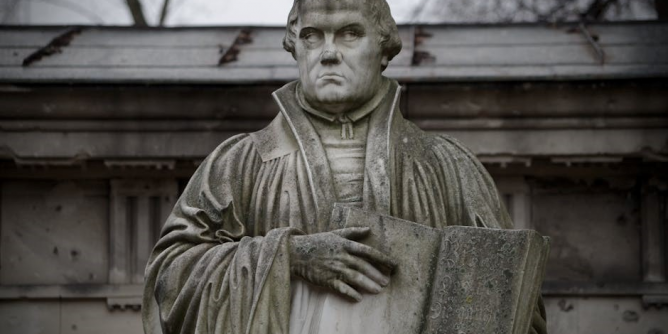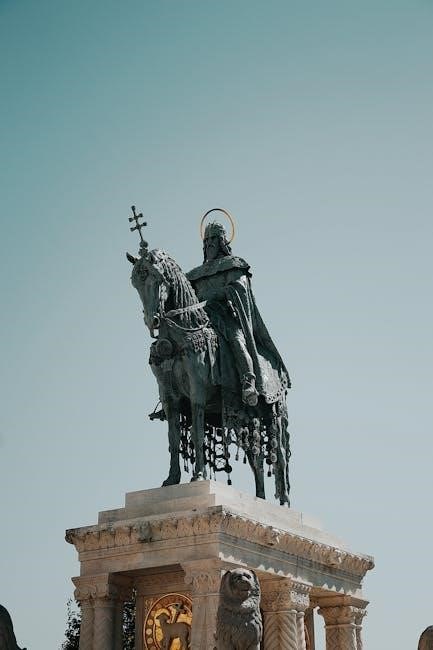
Oedipus the King‚ a masterpiece by Sophocles‚ is a classic Greek tragedy exploring themes of fate‚ free will‚ and identity. Its enduring relevance continues to captivate audiences worldwide‚ offering profound insights into human nature and moral dilemmas through the tragic story of Oedipus‚ the King of Thebes.
1.1 Brief Summary of the Play
Oedipus the King by Sophocles tells the tragic story of Oedipus‚ the ruler of Thebes‚ who seeks to uncover the truth behind a devastating plague afflicting his city. Determined to find the murderer of his predecessor‚ King Laïos‚ Oedipus embarks on a quest for justice. However‚ through a series of revelations‚ he discovers that he himself is the culprit‚ fulfilling a prophecy that he would kill his father and marry his mother. The play explores themes of fate‚ free will‚ and identity‚ culminating in Jocasta’s suicide and Oedipus’s self-blinding. This timeless Greek tragedy remains a powerful exploration of human suffering and the inevitability of destiny.
1.2 Why “Oedipus the King” is a Classic Tragedy
Oedipus the King stands as a classic tragedy due to its masterful exploration of universal themes such as fate‚ free will‚ and the human condition. Sophocles’ work exemplifies the Aristotelian concept of tragedy‚ evoking pity and fear through Oedipus’s downfall. The play’s dramatic structure‚ with its intricate plot and inevitable climax‚ showcases the protagonist’s tragic flaw—his relentless pursuit of truth despite ominous prophecies. The chorus adds depth‚ providing moral commentary and emotional resonance. Its enduring relevance lies in its ability to provoke reflection on the nature of destiny and human suffering‚ making it a cornerstone of Western literature and a timeless study of tragic heroism.

Historical Context of the Play
Oedipus the King‚ written by Sophocles in ancient Greece around 429 BC‚ reflects the cultural and philosophical values of its time‚ exploring themes of fate and divine justice.
2.1 When Was “Oedipus the King” Written?
Oedipus the King was written by Sophocles around 429 BC‚ making it one of his most renowned works. As part of the Theban trilogy‚ it predates Oedipus at Colonus and Antigone‚ although it comes first chronologically. The play’s composition during the Golden Age of Athens reflects the cultural and dramatic advancements of the time. Sophocles’ masterpiece has stood the test of time‚ remaining a cornerstone of classical literature and continuing to influence modern adaptations and interpretations. Its historical significance is further emphasized by its availability in various digital formats‚ including free PDF downloads‚ ensuring its accessibility to a global audience.
2.2 Sophocles and His Contribution to Greek Tragedy
Sophocles‚ a towering figure in Greek tragedy‚ revolutionized drama by expanding the chorus and developing complex characters. His works‚ including Oedipus the King‚ showcased profound psychological depth and moral dilemmas. As a playwright‚ politician‚ and mystic‚ Sophocles influenced Western literature‚ leaving a legacy of timeless themes like fate and identity. His plays‚ now widely available in PDF formats‚ continue to resonate‚ ensuring his enduring impact on theater and literature. Sophocles’ contributions remain unparalleled‚ solidifying his place as a pioneer in classical drama.

2.3 The Play’s Place in the Theban Plays Trilogy
Oedipus the King is the second play in Sophocles’ Theban trilogy‚ preceded by Oedipus at Colonus and followed by Antigone. Despite its chronological placement‚ it is often performed first due to its dramatic intensity and exploration of Oedipus’ downfall. The trilogy interconnectedly explores themes of fate‚ power‚ and justice‚ with Oedipus the King serving as the emotional and narrative core. Its availability in PDF has made it accessible for modern readers to engage with the entire trilogy‚ appreciating the depth of Sophocles’ storytelling and the tragic arc of Oedipus.

The Plot of “Oedipus the King”
Oedipus the King follows Oedipus’ quest to end a plague in Thebes‚ uncovering a prophecy that leads to his tragic downfall. The story explores his self-discovery and subsequent blindness‚ highlighting the inevitability of fate.
3.1 The Story of the Plague in Thebes
The play begins with a devastating plague sweeping through Thebes‚ afflicting plants‚ animals‚ and people alike. The city’s suffering prompts Oedipus‚ the king‚ to seek a solution‚ leading him to consult the oracle of Apollo. The oracle reveals that the plague is a punishment for harboring the murderer of Laius‚ the former king. Determined to save his city‚ Oedipus vows to find the culprit‚ unaware that he himself is the source of the curse. This sets in motion the tragic events that unfold‚ driven by fate and the relentless pursuit of truth.
3.2 Oedipus’s Quest for the Truth
Oedipus’s journey to uncover the truth is a central theme‚ driven by his determination to save Thebes from the plague. He begins by questioning Creon and the blind prophet Teiresias‚ whose revelations hint at his own guilt. Despite initial resistance‚ Oedipus persists‚ gathering clues that lead him closer to the shocking reality. His relentless pursuit of knowledge‚ despite warnings from Jocasta‚ underscores his tragic hubris. The truth‚ when finally revealed‚ exposes his unknowing fulfillment of the prophecy‚ making his quest both noble and doomed‚ highlighting the inevitability of fate.
3.3 The Climax: Oedipus Discovers His Identity
The climax unfolds as Oedipus uncovers the horrifying truth about his past. A messenger from Corinth reveals that he is not the biological son of Polybus and Merope‚ but was found abandoned as an infant. Jocasta‚ realizing the truth‚ tries to stop Oedipus‚ but he presses on‚ ultimately learning he is the son of Laius and Jocasta. This revelation confirms the prophecy he sought to escape‚ making him the murderer of his father and the husband of his mother. The discovery is a devastating moment of catharsis‚ marking the peak of Oedipus’s tragic downfall and the fulfillment of the oracle’s dire prediction.
3.4 The Tragic Resolution: Jocasta’s Death and Oedipus’s Blindness
The tragic resolution occurs when Jocasta‚ unable to bear the truth‚ takes her own life. Overcome with grief and guilt‚ Oedipus blinds himself‚ symbolizing his internal darkness and regret. This act marks his physical and emotional downfall‚ transforming him from a king to a humble‚ sightless wanderer. The chorus reflects on the inevitability of fate‚ while Oedipus‚ now fully aware of his actions‚ accepts his punishment. The play concludes with a sense of catharsis‚ as the characters and audience confront the harsh realities of fate and human suffering‚ leaving a lasting impact on the themes of tragedy and moral consequence.

Themes and Motifs in the Play
Fate vs. free will‚ identity‚ and the plague are central themes‚ exploring humanity’s struggle with destiny‚ self-discovery‚ and suffering‚ while motifs like prophecy and blindness underscore the tragedy’s depth.
4.1 Fate vs. Free Will
The play explores the tension between fate and free will‚ as Oedipus’s actions‚ though driven by personal decisions‚ ultimately fulfill the prophecy. Sophocles highlights the inevitability of fate‚ suggesting that even the noblest efforts to defy destiny are futile. Oedipus’s pursuit of truth and his attempts to avoid the oracle’s prediction ironically lead him to fulfill it‚ illustrating the tragic irony of his situation. This theme raises profound questions about human agency and the role of the divine‚ leaving audiences to ponder whether individuals can truly control their own destinies or if fate is inescapable.
4.2 The Search for Identity
Oedipus’s journey is deeply rooted in his quest for self-discovery‚ as he seeks to uncover the truth about his origins and identity. The play masterfully portrays his transformation from a confident ruler to a man grappling with the devastating revelation of his past. Through his relentless pursuit of knowledge‚ Oedipus confronts the mystery of who he truly is‚ leading to a tragic realization that challenges his sense of self and purpose. This theme resonates universally‚ as it reflects the human struggle to understand oneself and one’s place in the world‚ making Oedipus’s story a timeless exploration of identity and existential crisis.
4.3 The Significance of the Plague as a Motif
The plague in Thebes serves as a powerful motif‚ symbolizing both the physical and moral decay afflicting the city. It represents divine retribution for the unaddressed sins of the past‚ creating a sense of collective guilt and urgency. The plague not only drives the plot forward but also mirrors Oedipus’s internal turmoil‚ as the city’s suffering reflects his own tragic fate. Sophocles uses the plague to underscore the interconnectedness of individual and societal suffering‚ highlighting the idea that moral corruption can have far-reaching consequences. This motif adds depth to the narrative‚ emphasizing themes of justice‚ atonement‚ and the inevitability of fate.

Character Analysis
The characters in Oedipus the King are deeply interconnected‚ with Oedipus embodying the tragic hero archetype. His determination and flaws drive the narrative‚ while others like Jocasta‚ Creon‚ and Teiresias add complexity‚ each contributing to the unfolding tragedy and themes of fate and identity.

5.1 Oedipus: The Tragic Hero
Oedipus is the quintessential tragic hero‚ embodying nobility and flaws that drive the play’s devastating outcome. As King of Thebes‚ he is determined and just‚ yet his hubris and relentless pursuit of truth lead to his downfall. His inability to accept fate and his insistence on uncovering the prophecy result in the revelation of his unintended crimes. The tragic irony lies in his blindness to the truth‚ both literally and metaphorically‚ until it is too late. His fall from grace evokes pity and fear‚ fulfilling Aristotle’s definition of a tragic hero. Oedipus’s story explores the tension between fate and free will‚ leaving a lasting impact on literature and psychology‚ symbolized by the Oedipus complex.
5.2 Jocasta: The Tragic Figure of Oedipus’s Mother
Jocasta‚ as Oedipus’s mother and wife‚ embodies a tragic complexity‚ her life intertwined with the prophecy that haunts her family. Initially‚ she is a figure of maternal strength and wisdom‚ attempting to mediate between Oedipus and Creon. However‚ as the truth unfolds‚ her realization of the horrific reality leads to her tragic demise. Her death‚ a result of her own hand‚ symbolizes the devastating consequences of fate and the unbreakable chain of events set in motion by the prophecy. Jocasta’s character serves as a poignant reminder of the inevitability of fate and the suffering it imposes on innocent individuals‚ deepening the play’s exploration of human tragedy and moral conflict.
5.3 Other Key Characters: Creon‚ Teiresias‚ and the Chorus
Creon‚ Oedipus’s brother-in-law‚ represents ambition and pragmatism‚ often clashing with Oedipus due to political tensions. Teiresias‚ the blind prophet‚ embodies wisdom and foresight‚ delivering crucial truths that drive the plot. The Chorus‚ composed of Theban elders‚ provides moral commentary and emotional depth‚ serving as a bridge between the audience and the action. Their collective roles enhance the tragic dynamics‚ with Creon’s cautious pragmatism contrasting Teiresias’s divine insight‚ while the Chorus offers reflections on the unfolding tragedy‚ enriching the narrative’s emotional and philosophical layers.

How to Access “Oedipus the King” in PDF Format
Oedipus the King is widely available as a free PDF download on platforms like Project Gutenberg and Audible‚ offering easy access to this timeless tragic masterpiece.
6.1 Where to Download the PDF for Free
Free PDF versions of Oedipus the King are available on platforms like Project Gutenberg‚ Google Books‚ and Internet Archive. These sites offer downloadable editions without registration or fees. Additionally‚ websites such as ManyBooks and Audible provide free or low-cost access to the play in digital formats. Some academic and literary websites also host free PDFs of Sophocles’ work‚ making it easily accessible for readers worldwide. These sources ensure that this classic tragedy remains widely available for educational and personal use.
6.2 Popular Editions of the Play Available as PDF
Several editions of Oedipus the King are widely available as PDFs. The Project Gutenberg edition offers a classic‚ unaltered version of the play. Modern Library and Penguin Classics provide annotated editions with introductions and commentary. Additionally‚ translations by renowned scholars like Bernard Knox and adaptations by W.B. Yeats are popular choices. These editions are accessible on platforms like Google Books‚ Amazon‚ and academic databases. They cater to both casual readers and scholars‚ ensuring a rich and immersive reading experience of this timeless tragedy.
6.3 Why “Oedipus the King” is Popular in Digital Formats
The enduring popularity of Oedipus the King in digital formats stems from its timeless themes and accessibility. Digital versions offer convenience‚ with free or low-cost access on platforms like Project Gutenberg and Google Books. Features such as searchable text and annotations enhance study and analysis. The play’s exploration of fate‚ free will‚ and identity remains universally relevant‚ attracting both scholars and casual readers. Digital formats also promote sustainability by reducing paper use and offer adjustable font sizes for better readability. Additionally‚ the availability of multiple editions and translations ensures a broad appeal‚ making it a favorite in digital libraries worldwide.

Cultural and Literary Impact
Oedipus the King has profoundly influenced Western literature‚ inspiring countless adaptations in theater‚ film‚ and psychology. Its themes of fate and identity continue to resonate globally‚ shaping modern storytelling and cultural discourse.
7.1 Influence on Western Literature
Oedipus the King has left an indelible mark on Western literature‚ shaping tragic drama and narrative structure. Its exploration of fate‚ free will‚ and human suffering has inspired countless authors‚ from Shakespeare to modern writers‚ influencing themes and character development across genres. The play’s psychological depth‚ particularly the Oedipus complex‚ has become a cornerstone in literary and psychological analysis. Its universal themes continue to resonate‚ making it a timeless classic that remains relevant in contemporary storytelling and academic study. The play’s influence extends beyond literature‚ impacting theater‚ film‚ and philosophy‚ ensuring its enduring legacy in cultural and intellectual history.
7.2 Adaptations in Film and Theater
Oedipus the King has been widely adapted in film and theater‚ with numerous interpretations that emphasize its universal themes. The play’s tragic narrative has been reimagined in various cultural contexts‚ from classical stage productions to modern cinematic interpretations. Notable adaptations include Pier Paolo Pasolini’s 1967 film Oedipus Rex‚ which captures the play’s dramatic intensity‚ and W.B. Yeats’s modernized version for the stage. These adaptations highlight the timeless appeal of Sophocles’ work‚ allowing new audiences to engage with the story’s profound exploration of fate‚ identity‚ and human suffering. Each adaptation offers a fresh perspective‚ ensuring the play’s continued relevance in contemporary arts.
7.3 Psychological Insights: The Oedipus Complex
The Oedipus Complex‚ a psychological concept introduced by Sigmund Freud‚ is deeply rooted in the tragic narrative of Oedipus the King. Freud used the story to describe a child’s unconscious desire for the opposite-sex parent‚ a theme central to Oedipus’s unknowing fulfillment of the prophecy. The play’s exploration of fate‚ identity‚ and moral conflict aligns with Freud’s theory‚ offering insights into human psychology. This concept has become a cornerstone in psychoanalytic thought‚ linking literature and psychology in a timeless manner. The Oedipus Complex remains a significant topic in both literary and psychological analysis‚ showcasing the enduring relevance of Sophocles’ work.
7.4 Modern Interpretations and Relevance
Oedipus the King remains a timeless masterpiece‚ resonating with modern audiences through its universal themes. Contemporary interpretations often focus on the struggle between fate and personal responsibility‚ as well as the complexities of leadership. The play’s exploration of identity and moral ambiguity continues to inspire new adaptations in theater‚ film‚ and literature. Digital formats like PDF have made the play accessible to a global audience‚ ensuring its relevance in the digital age. Its themes of truth-seeking and human frailty maintain its significance‚ making Oedipus the King a work that transcends time and cultural boundaries‚ offering fresh insights to each new generation.

Oedipus the King remains a cornerstone of literature‚ exploring fate‚ identity‚ and human frailty. Its themes resonate universally‚ ensuring its relevance in modern times through accessible PDF formats.
8.1 Summary of Key Points
Oedipus the King is a timeless tragedy by Sophocles‚ exploring themes of fate‚ free will‚ and identity. The play revolves around Oedipus‚ a tragic hero whose quest for truth uncovers a devastating prophecy. Its exploration of human suffering and moral dilemmas continues to resonate‚ making it a cornerstone of literature. The play’s cultural impact is profound‚ influencing psychology with the Oedipus complex and remaining a staple in theater and film adaptations. Available in PDF formats‚ the play ensures accessibility for modern readers‚ preserving its relevance and allowing new generations to engage with its enduring themes and insights.
8.2 Final Thoughts on the Significance of “Oedipus the King”
Oedipus the King remains a monumental work in world literature‚ offering universal truths about humanity’s struggle with fate and self-discovery. Its exploration of moral complexity and emotional depth continues to inspire adaptations and psychological analysis. The play’s themes resonate across cultures and time‚ making it a vital study in understanding the human condition. The availability of the play in PDF format ensures its accessibility‚ allowing readers to engage with its profound insights and reflect on its timeless relevance. Sophocles’ masterpiece endures as a testament to the power of tragedy to provoke thought and emotion‚ solidifying its place in the canon of great works.